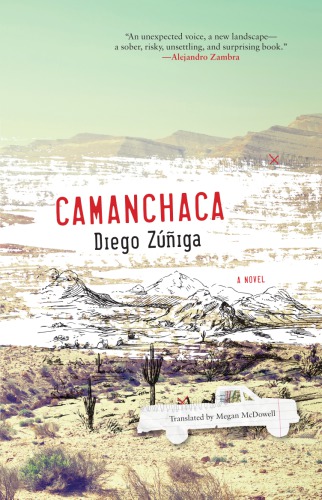
Camanchaca
کتاب های مرتبط
- اطلاعات
- نقد و بررسی
- دیدگاه کاربران
نقد و بررسی

December 5, 2016
This striking novel helps introduce Zúñiga, acclaimed Chilean author and journalist, to a wider English-language audience. Spurred by an offer to save his teeth from receding gums, a quiet and introspective young man joins his estranged father on a drive across the Atacama Desert from Santiago to Iquique. Along the way, the 20-year-old unnamed narrator begins to reflect on his relationships with his parents. Preparing to cross the border into Peru to visit a dentist in Tacna, he struggles to contextualize the broken recollections of his youth: his parent’s separation when he was a child, a troubling moment with his mother, and the ambiguous details of his uncle Neno’s death. Returning to his childhood home, the narrator seeks information on the whereabouts of a missing cousin who might have answers. With this skillful translation by McDowell, the story sustains suspense by gradually revealing itself. The fractured narrative switches from page to page between past revelations and present observations, mirroring the restless mind of the protagonist as he searches for connections. Zúñiga cleverly uses this technique to represent a young person’s hunger for self-actualization. As the book progresses, “like someone putting together and taking apart a worn-out puzzle,” these shattered pieces of prose—sometimes only a single poignant sentence or evocative paragraph—join together to build a vivid mosaic. This arresting and deeply affecting read, despite its short length, packs a punch.

January 1, 2017
A young man strains to understand the source of his parents' split as well as an uncle's suspicious death.The unnamed narrator of Zuniga's spare English debut is 20 years old and on a road trip with his father through Chile's Atacama Desert, spending time with that side of the family before getting some dental work done. (The narrator has bleeding-gum issues after spending his adolescence subsisting entirely on junk food, it seems.) This simple plot has plenty of storm clouds: as the first page explains, he believes his father killed his uncle Neno years before, though the novel is less an investigation than a meditation on this act. The novel's structure highlights the narrator's split existence: one to two paragraphs per page, with each page alternating between the young man's travels with dad and his childhood with mom. The latter experience, in his telling, was dour bordering on oppressive: he recalls being an aspiring journalist as his mother sparingly reveals details about Neno; the narrator's dead brother; and her split from his father. Dad, meanwhile, is upbeat, with a new wife and son, though he keeps his distance from his own father, a devout Jehovah's Witness. A camanchaca is a fog unique to Chile in parts where the desert abuts the coast, a fitting metaphor for the deliberate fuzziness of memory and emotion that Zuniga cultivates. "[Dad] explains that one must respect the desert and the highway, that not just anyone can drive there," he writes, which is a bit of bluster but also underscores the point that navigating those memories won't be easy. The book's brevity and mannered structure dampen its emotional impact; it will be interesting to see what Zuniga can do with a broader canvas. But he's thoughtfully commanded three complex lives in a limited space. A smart, straightforward narrative that reveals the varied mood a shared experience can evoke.
COPYRIGHT(2017) Kirkus Reviews, ALL RIGHTS RESERVED.

December 1, 2016
A Chilean author who's racked up major honors--e.g., the Chilean National Book and Reading Council Award--Zuniga here effectively portrays a disaffected but insightful young man whose story emerges on a drive through Chile's Atacama Desert. The narrative appears as a single paragraph per page, with the white spaces suggesting the emptiness of Chile's vast stretches and of the narrator's life. As he explains, his parents separated when he was four, and his father moved while he stayed with his mother in Santiago. Now 20, he remains caught up in her neediness, his jovial noncommunication, a mysterious death in the family, and the sticky web of his father's new family, these fractured relationships delivered in plainspoken, reportorial prose. But it's precisely this coolly observant language, deepening with the story, that lets us register the buried despair. VERDICT A fine, disturbing portrait of a broken family that smart readers (including venturesome YAs) will appreciate.
Copyright 2016 Library Journal, LLC Used with permission.

























دیدگاه کاربران